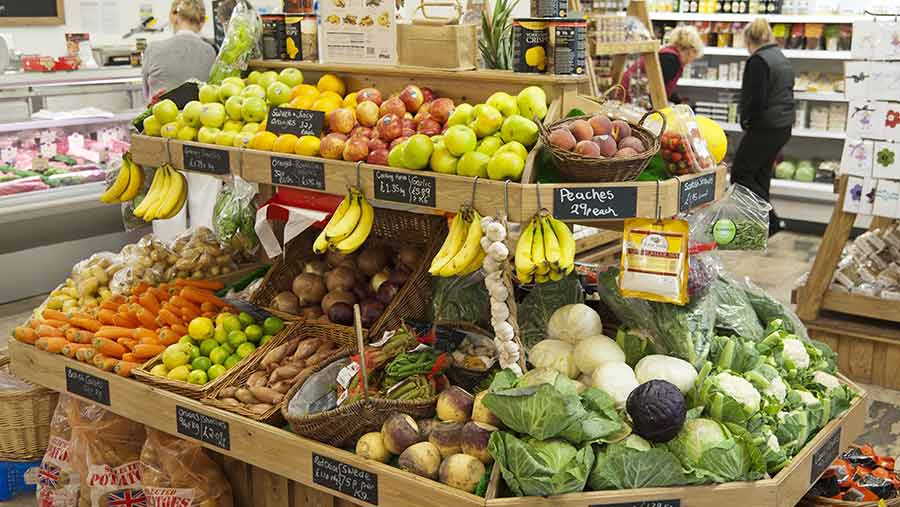EU exit threat to UK food security, says report
 © FLPA/REX Shutterstock
© FLPA/REX Shutterstock A major restructuring of agricultural policy will be needed to maintain food security if the UK leaves the European Union, academics have warned.
The UK’s forthcoming in-out referendum on 23 June will have “momentous significance” for the country’s food system, says a report by Food Research Collaboration.
Called Food, the UK and the EU: Brexit or Bremain?, the briefing paper argues that country must “wake up to the enormity of unravelling 43 years of co-negotiated food legislation”.
See also: Farm leaders accused of scaremongering over EU exit
Both consumers and food businesses would be affected by a referendum vote that results in the UK leaving the EU, it says.
If the country decided to leave, food imports would become more expensive, prices would increase and there could be major disruptions to supply chains, says the report.
With such prices increases for imported goods, the report suggests there could be consequences for the consumption of foods that the UK relies on EU nations to produce.
Nearly 40% of the UK’s total food supply of fruit and vegetables comes from the EU, and nearly 55% of its supply of pigmeat, says the document.
The UK is about 60% food self-sufficient and people should therefore be wary of instant independence from the EU, it adds.
The report also warns of a potential “food service and food factory crisis” if EU labour currently working in those industries lost their freedom of movement to be in the UK.
The report was co-authored by Food Research Collaboration chairman Tim Lang, who is director of the Centre for Food Policy at City University London.
He said: “The referendum will be a defining moment in UK food policy, with hugely important implications for both consumers and businesses.”
The report outlined the real impact of the EU on UK food, said Professor Lang.
“The Brits need to stop joking about wine lakes, bent bananas and myths from the EU past, which have been sorted, and get real about security of food supply today and tomorrow.
“It is not simply a choice about farming – the decision will affect the entire UK food system and all of our daily lives. Food prices will almost certainly go up, affected by a weakened sterling.
“The UK is in a vulnerable position already with a food trade gap of £21bn in the red – we import far more food than we export.
Figures show EU employees make up more than a quarter of the food manufacturing workforce (26.9%) and a tenth of workers in food and beverage services (11.3%).
This compared with 6.1% across the UK economy as a whole, said Prof Lang.
“If the people vote for Brexit, there’ll need to be a ‘dig for victory’ on an unprecedented scale. And this won’t be using the EU labour that currently grows, picks and processes so much British food.
EU membership wasn’t without its frustrations, acknowledged Prof Lang.
But British people should be provided with the facts if the country was to break away from four decades of hard-fought policy, he said.
“The public has been woefully ill-informed on this subject by politicians, for instance Defra has seven times more civil servants, despite massive cuts, than has DG Agri in Brussels.”
Prof Lang said people should ask which was better – to use British muscle to try to shift the food system in a more sustainable direction, or to waste years negotiating an isolationist position?
The report is likely to be viewed by EU supporters as another reason for the UK to remain a member of the trading bloc.
But those who want to leave say such views are little more than scaremongering and insist the UK has everything to gain by going it alone.
Speaking at this year’s Oxford Farming Conference, leave campaigner and former Defra secretary Owen Paterson said UK farming would thrive outside the EU.
“The first priority in growing the rural economy should be to increase food production,” Mr Paterson told listeners.
The food chain contributed £85bn per year to the UK economy, supported 3.5m jobs and provided 62% of the food we eat.
“Food and drink is the UK’s largest manufacturing industry – bigger than cars and aerospace combined; it employs one in eight people.
“Many of these jobs are located in rural areas.
“A UK policy should encourage import substitution, the export of quality products, and the government should direct public procurement, worth £2.4bn, towards UK producers.”
